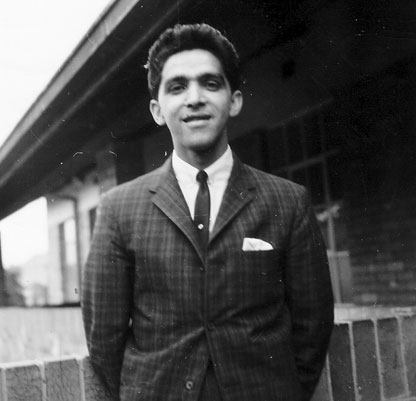26 October, 2011 – Statement on behalf of Mr Imtiaz Cajee, nephew of Ahmed Timol and author of the book Timol: A Quest for Justice
In 2009 President Jacob Zuma posthumously awarded the Order of Luthuli to Ahmed Timol for his “excellent contribution and selfless sacrifice” in the anti-apartheid struggle. But the truth remains elusive around the death in police detention on 27 October 1971 of this 29-year-old school teacher.
Five days after his arrest at a police roadblock on 22 October 1971, Timol was found dead. An inquest found that he had jumped to his death from the 10th floor of the infamous John Vorster Square Police Station, despite the numerous gruesome marks and bruises found on his body. He became the 22nd person to have died in police detention in South Africa.
More than 40 years later his family is still searching for answers explaining what happened to this young activist.
His nephew Imtiaz Cajee who, in 2005, published a book Timol: A Quest for Justice is determined to someday uncover the detail surrounding his uncle’s untimely death.
He believes there is sufficient evidence to indicate that his uncle’s activities were monitored by the South African Police’s Security Branch while he trained at the Teacher’s Training College and it is likely that they also followed his years from 1960 to 1966 as a teacher at the Roodepoort Indian High School.
Please click on the image below to view a larger display
Timol’s stay in London with banned activists was known to the South African Police’s then notorious Security Branch and this information was shared with British Intelligence; as was his political training, with former President Thabo Mbeki at Lenin University in Moscow in 1969. Reports indicate that the Lenin University was infiltrated by the United States’ Central Intelligence Agency (CIA) and that they shared information with both British and South African intelligence bodies.
South Africa’s Security Branch and the Bureau of State Security (BOSS) knew that after his return home in February 1970, Timol helped to set up underground structures for the banned Communist Party. His communication with his handlers in London through secret coded text messages was intercepted, indicating that his operation had been compromised.
The police claimed that he was arrested at a “routine” police roadblock; however, evidence shows that an order for his arrest had been granted by the Commissioner of Police.
Cajee believes there are community members who are aware of what really happened to his uncle. He also hopes that better access to archival evidence will enable him and others to find official information relating to the death of his uncle and many other activists.
When he died, the overwhelming majority of South Africans poured their hearts out to the Timol family. Inter-denominational prayer meetings were held; public gatherings blamed the apartheid regime and some ordinary white South Africans wrote to the media asking the apartheid government to account for his death. Students and lecturers protested at various educational institutions; and internationally, the United Nations, the National Union of Students (NUS) of the United Kingdom, the North London Association of the National Union of Teachers and Amnesty International all condemned the apartheid regime for its role.
Timol’s death, between the end of the Rivonia Trial in 1964, which saw Nelson Mandela and seven of his comrades jailed for life and the 1976 Soweto Uprising, became an important milestone in the history of the liberation struggle. The apartheid regime believed it had crushed all opposition to the state, but activists like Timol kept up the struggle. His death served as an inspiration to many other activists to continue the fight for democracy in South Africa.
A Truth and Reconciliation Commission (TRC) hearing in April 1996 failed to uncover new information about Timol’s death. It served only as an instrument for his mother, Hawa to relive her tragic ordeal through her testimony.
On the 29 March 1999 President Nelson Mandela spoke at the renaming of the Azaadville Secondary School, as the Ahmed Timol Secondary School. He said: “Timol was a brave young man who believed in freedom and justice, and who fought for non-racialism and democracy.”
